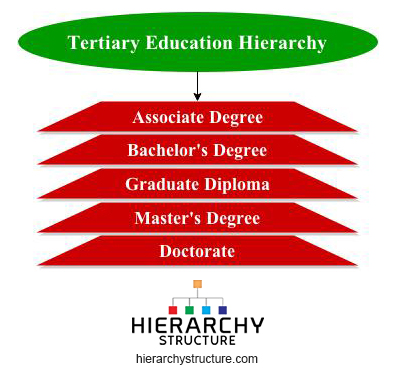Tertiary or third level education is referred to as the educational level which lies after post-secondary education. Tertiary education commences after post-secondary or school level education is completed by an individual. These days, the concept of tertiary education isn’t rare and is rather considered as a mandatory requirement for anyone who wants to take up a respectable job.
Tertiary education or qualification makes job seekers employable, even though it may not always guarantee success. As soon as a person steps out of school or secondary education, he/she has to choose a tertiary education path which is not just to his/her liking and interests but also guarantees a career ahead. The following is a detailed tertiary education hierarchy to help you understand the various education levels present after schooling:
 Associate Degree
Associate Degree
An associate degree is a kind of a tertiary education option which usually lasts for two years and provides broad-based competency in a particular field. An associate degree can be considered like an advanced diploma which is more academic than vocational and is offered by a lot of colleges and universities across the world.
Bachelor’s Degree
One of the most commonly picked tertiary level education option is a bachelor’s degree. This is a standard university degree which takes about 3-4 years to complete and is a full time study option. Bachelor’s degrees are mostly recognized worldwide and help an individual to study a subject or subjects of his/her choice. Bachelor’s degrees are also referred to as undergraduate or graduate level degrees.
Graduate Diploma or Graduate Certificate
After completing undergraduate or bachelor’s level degrees or courses, one can also opt for graduate diploma or graduate certificate course. These courses help the individual venture into a more advanced level study of the area which the individual has already gained knowledge in during the bachelor’s program. While some diploma courses take 6 months to complete, others might take 12 months.
Master’s Degree
The next level which is an alternative to a graduate diploma is a master’s degree which takes 1-2 years to complete. These are specialized courses which focus on mainly one major field of interest and combine research and coursework.
Doctorate
After completing master’s level education, one can proceed to study further and gain more knowledge and skills of his/her area of study. Also known as PhD. Doctorate courses take different time to complete in different nations and may also first require the candidate to complete an M.Phil.
